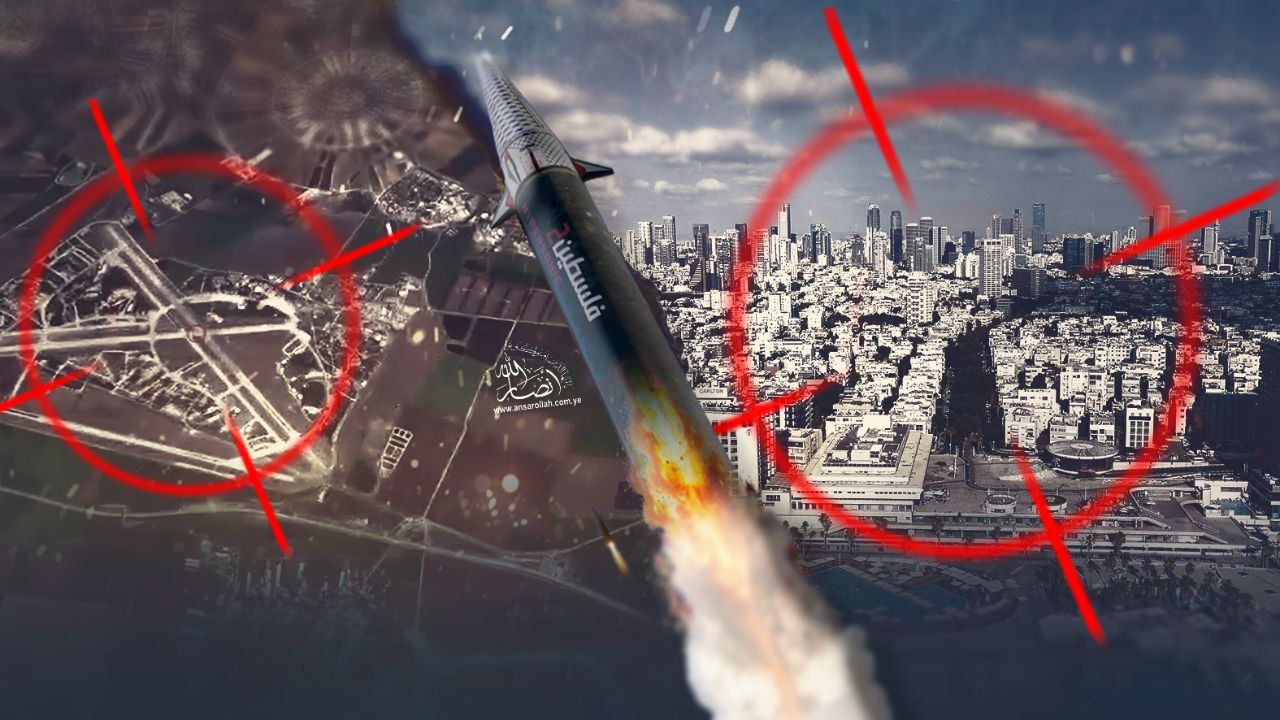As the Israeli enemy mobilizes its forces and weaponry in preparation for a new round of escalation in Gaza, it is blindsided by a resounding blow that plunges it into a real predicament. A Yemeni hypersonic missile pierces through six layers of advanced air defense systems to strike what the Zionist enemy describes as its most fortified target—Lod Airport, known as "Ben Gurion." In an instant, the site is transformed into a scene of destruction and chaos: shrapnel scattered across the area, smoke billowing into the sky, and a 25-meter-deep crater tearing through Runway 3, just 200 meters from the control tower. Three million Zionist settlers take refuge in shelters, and life grinds to a halt in occupied Yaffa.
The Zionist enemy is dealt a severe security, political, military, and economic blow. The airport is shut down, airlines suspend their flights, and the enemy’s "army" admits that the missile reached its target. Scenes of panic among settlers flood social media. The event dominates global media coverage, with widespread acknowledgment of the Zionist entity’s failure. The Israeli enemy has proven helpless. The American aggression proves incapable of defending itself, and the entity’s air defense systems are likewise powerless. The tools of Zionism in the region were the first to feel the sting of Yemen’s retaliatory strikes.
The economic impact is underscored by the financial website "Investing", which confirms that the Yemeni missile hit the "Tel Aviv" Stock Exchange, with 50% of Zionist economic sectors suffering immediate losses. The site reports that six sectors incurred direct market value losses following Yemen’s targeting of the airport, specifically the banking, oil and gas, finance, real estate, investment, and construction sectors.
Comprehensive Ban on the Entity
The ordeal did not end there; the strike on "Ben Gurion" was only the beginning. The Yemeni Armed Forces declared loud and clear: all of the Zionist enemy’s airports are now under total siege. International airlines are advised to cancel all flights to the airports of the criminal enemy to ensure the safety of their aircraft and passengers.
President Al-Mashat, for his part, advises the Zionist settlers not to place their trust in either Netanyahu or Trump, declaring that Yemen will not halt its military operations targeting the occupied territories unless the aggression against Gaza ends and the blockade is lifted. He warned that the cost of ignoring demands to stop the war in Gaza will be high and will compel Yemen to adopt further escalatory options. He added that settlers still have a chance to return to their countries of origin and leave Palestine before they lose the ability to do so.
The Humanitarian Operations Coordination Center in Sana'a issued a formal communication to the International Civil Aviation Organization and the International Air Transport Association, warning them to avoid air navigation to and from the airports of the occupying Zionist entity, foremost among them Lod Airport—referred to as "Ben Gurion"—as these airports are under continuous threat of targeting by the Yemeni Armed Forces.
Airlines Respond
Amid the shock, airlines rushed to comply with Yemen’s decision—no delays, as the situation is dire with serious consequences. When Yemen speaks, it acts. The Zionist entity’s Channel 13 confirmed that 20 international airlines suspended their flights to Lod airport following the Yemeni attack.
The American aviation giant Delta Airlines canceled its flights, along with many others: Air Europa, as well as Polish, Greek, Irish, and Belgian airlines all called off their scheduled trips to Lod Airport. Nearly 80 flights to Lod Airport were canceled on May 5. The website "FlightRadar" reported that the airport’s flight arrival delay index reached a record high.
The Zionist newspaper "Maariv" expressed concern over the situation, noting that widespread flight cancellations will later require significant time and effort to persuade airlines to return. "Our past experiences confirm that airlines are extremely cautious when deciding to resume flights," the newspaper stated.
Numerous flights were suspended at the time of the missile strike. These included Spain’s Air Europa and the Lufthansa Group, which encompasses Lufthansa (Germany), SWISS, Austrian Airlines, and Brussels Airlines. Others included Air Europa, Air India, and Italy’s ITA Airways.
The newspaper noted that around 34,700 passengers were scheduled to depart the entity on Sunday, while 31,500 were expected to arrive. The entity’s Airports Authority revealed that roughly 66,200 passengers were expected to pass through Ben Gurion Airport on Monday on 422 international flights.
Pinchas Idan, Chairman of the Airports Authority in the Zionist entity, confirmed: “The missile landed on our territory, near the aircraft. There was a thick cloud of black smoke, and no interception operations were visible. The explosion was heard throughout the area. It was very close to the planes—too close. Fortunately, one plane that was airborne landed safely. For now, everything is suspended. Each airline must decide on its own whether to resume flights. I urge them not to make any decisions until the situation stabilizes.”
The Hebrew website "Walla" published a report on the impact of flight cancellations and listed the companies that halted operations. These included Wizz Air, Air India, Air Europa, TUS Airways, Lufthansa, Austrian Airlines, Brussels Airlines, United Airlines, Air Canada, and SWISS. The Lufthansa Group announced that all its flights—including SWISS, Austrian, Brussels, and Eurowings—will remain suspended until May 6. Additional companies later joined the list, including Transavia, Ryanair, Delta, Nippon, and British Airways.
In the website's interview, a number of "Israeli" passengers expressed deep frustration at the sudden cancellations. Settler Liram Elkaim, who was preparing to fly to Larnaca, arrived at the airport with all her luggage, only to be surprised at the last minute by the cancellation. “I can’t believe I got all the way here, only to be told at the last minute that the flight was canceled. How long will we have to live under these threats? How long will our lives be disrupted like this? They can threaten us every other day, and Israel does nothing,” she told Walla.
Elkaim continued: “We used to be threatened by Gaza. Now, are we supposed to get used to threats from Yemen as well? It seems an unspoken equation is being imposed on us. People here are angry and don’t understand how flights are canceled while the media claims the airport is operating normally. At the very least, be transparent.”
In another account documented by the website, settler Efrat Ilouz, who planned to fly to Thessaloniki via Ryanair, said her flight was scheduled for 10:00 p.m., but she only discovered it was canceled without prior notice. “I didn’t receive any email, and only when I checked the app did I find out it was canceled. The confirmation email came an hour later. I was going to visit relatives and had taken time off work. Now I’m deeply disappointed.”
Ilouz added, according to Walla: “I tried to get compensation or book an alternative flight, but the website was unclear. What’s happening is unacceptable.”
After the Air Ban
The Zionist entity is experiencing unprecedented confusion. Discussions have begun regarding the post-response phase following the international airlines’ compliance with Yemen’s decision. The Zionist site "The Marker" revealed that if more airlines are instructed to cancel their flights, the entity will find itself in serious trouble, with the next 24 hours being critical for the enemy’s aviation sector.
The Director General of the Zionist "Ministry of Transport" told the Zionist newspaper "Globes": “With foreign airlines canceling their flights, we will not tolerate fare hikes by Israeli airlines. We are doing our utmost to prevent further cancellations by foreign companies.” He revealed that 17 out of 32 foreign airlines have already suspended their flights, leaving only three local carriers.
The CEO of Zionist company "Signal" expressed hope that airlines do not prolong their suspensions, warning it would lead to serious losses and price surges. Nir Mazor, Vice President of Zionist Aviation Relations, confirmed that the root of the problem lies again in low-cost carriers and companies like Lufthansa and others. Similarly, the CEO of Zionist company "Ofakim" stated that it is still difficult to predict whether international airlines will continue operations in “Israel,” as they are monitoring the situation closely.
The Hebrew newspaper "Maariv" summarized the scene: “The unprecedented Yemeni achievement was not merely shutting down Ben Gurion Airport for two hours, but rather the symbolic destruction of one of the pillars of ‘Israeli sovereignty’ and isolating the entity from the outside world. The Houthis have already disrupted Zionist maritime navigation for over a year and a half, preventing commercial ships from reaching "Eilat" and other ports, and have concentrated efforts on attacking the ports of Haifa, Ashdod, and the energy terminal in Asqalan.” The newspaper revealed that the Yemeni threat targets another vital area, noting that in one instance, a drone crashed just meters from the bridge surrounding the energy center.
The Hebrew news site "Ynetnews" confirmed the gravity of the situation: “The missile that struck Ben Gurion Airport was a victory for the Houthis and once again demonstrated that our interception systems are not foolproof. Despite American airstrikes targeting Houthi capabilities, they remain capable of launching missiles. This marks the third time both Israeli and American air defenses have failed to intercept a ballistic missile launched from Yemen.”
No Safe Haven for Zionists
The Hebrew site "Ynet" quoted Michael Milstein, head of the Palestinian Studies Forum at the Zionist Tel Aviv University, as saying the missile launched from Yemen and which landed at Ben Gurion Airport reveals a complex reality: despite its military achievements, “Israel” is still engaged in multi-front warfare and lacks a clear, coherent strategy to address these mounting challenges. He noted that the targeting of the "Houthi" missile on Ben Gurion Airport was not an isolated incident, but part of an ongoing “war on seven fronts” that has persisted for the past 17 months. He described the incident as a harbinger of the uncertain fate awaiting "Isrealis", particularly in light of the decision to intensify the military campaign in Gaza.
CNN confirmed that “a successful Yemeni missile strike on Ben Gurion Airport represents a major security breach at one of the most protected sites, raising serious questions about "Israel" 's ability to intercept such attacks despite its much-vaunted missile defense system.” The New York Times added: “We are witnessing one of the Houthis’ most significant successes in recent months, and one of the gravest failures for "Israel"—a missile that breached all air defenses and struck Ben Gurion Airport.”
The U.S. site "The Media Line" highlighted the serious consequences of the missile strike on the Lod Airport in occupied Yaffa. It quoted Danny Citrinowicz, a researcher at the "Institute for National Security Studies" in "Tel Aviv", saying: “This is an enemy unlike any Israel has faced before. They are far from Israel, yet highly motivated. Their fight is ideological, and there is no ideal solution to this challenge.” He added, “It is highly unlikely that Israel will be able to stop this as long as the war in Gaza continues, directly linking the Gaza conflict to the escalation in Houthi attacks.”
Citrinowicz warned: “The Americans have used nearly all their capabilities against the Houthis. What more can Israel offer?” He cautioned that direct strikes will not eliminate the threat, given the strategic challenges the Houthis pose on both regional and global levels.
The Hebrew newspaper "Yedioth Ahronoth" considered that the missile launched from Yemen and which left a massive crater near the enemy’s main international airport, granted Ansar Allah a significant psychological achievement. However, the paper emphasized the need to view the event within its operational context, as it marked the third failure to intercept a ballistic missile launched from Yemen, despite the deployment of the U.S.-backed THAAD missile defense batteries.







